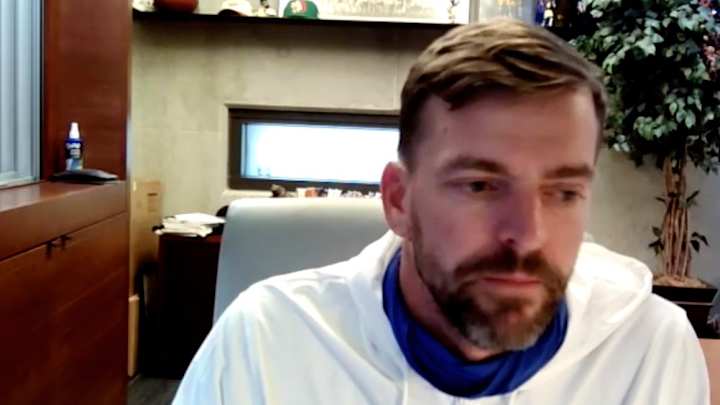Cal Football: Justin Wilcox Frustrated by the Need to Cancel Washington Game

Clearly frustrated and bordering on angry at times, Cal football coach Justin Wilcox said the team would need clearance from the Berkeley public health department no later than Monday in order to play next Saturday’s game at Arizona State.
Wilcox talked to reporters on a Zoom call for about 30 minutes Thursday afternoon, hours after the Pac-12 announced that Cal’s season-opening game against Washington, scheduled for Saturday at Memorial Stadium, had been canceled.
“I’d be lying if I said I wasn’t, you know, got my blood boiling a little bit,” he said. “We respect the virus and the seriousness of it. (Players have) done a really good job of trying to do everything we’ve asked them to do, that the institution has asked them to do and we thought that the state and (Berkeley) public health office was asking them to do.
“So when the game gets taken away from you, that can be an emotional moment.”
One Cal player tested positive for COVID-19, the athletic department announced on Wednesday, and other players have been quarantined as a result of contact tracing. None of those in quarantine have tested positive, Wilcox said.
“Obviously disappointing day for us. I’m sick for our players and feel for them. I feel for the guys at Washington,” Wilcox said. "Everybody was looking forward to this game. It’s a tough pill to swallow.”
Wilcox had issue with the characterization that Cal requested the game be canceled.
“We did not request to cancel the game. We weren’t able to play the game. Maybe that’s what the paperwork says,” he said. “The contact tracing eliminated a lot of players and an entire position group and it was not going to be feasible.”
Wilcox is not permitted to reveal which position group was impacted, but it’s believed to be either the offensive or defensive line. He also said others, perhaps players and/or coaches, were implicated in the contact tracing.
It was the lack of any available players at one position group that forced Cal's hand.
“We had zero (players from that group) at practice for the last few days. It wasn’t feasible to put a team out there,” Wilcox said. “If it was certain positions where you could kind of sub guys, we would have done that, absolutely. But it wasn’t.”
Asked about the Nov. 14 game at ASU, Wilcox said, “I wish I knew the answer to that. That’s determined by the local public health office, not me, not our trainers and doctors, not Cal. That’s determined through the contact tracing of the local public health office, which is not affiliated with the university.”
Wilcox said the university has given Berkeley health some guidance on when it needs an answer that would clear the way to play in Tempe.
“We would hope to know sometime between tomorrow and Monday,” he said. “We do not have an answer on that yet. It was made known (to Berkeley health) that we would need to know this weekend or at the latest on Monday in order to move forward appropriately.”
Wilcox said the athletic department and university have tried since the start of the pandemic to implement protocols that meet or exceed all local and state health department guidelines. He said the university continually asks what more it can do to safeguard players and meet the contact tracing standards.
But he and his players look around and see other places where contact tracing is executed differently.
"I think the frustrating part is you see the differences throughout the state and the country on how these contact tracing process are taking place,” Wilcox said. “I think that’s where the players especially can get a little bit frustrated, as you can imagine, that there’s no consistency there.”
ESPN provided this explanation from Berkeley Public Health:
A spokesman for Berkeley Public Health told ESPN the negative test results do not allow someone to exit the quarantine protocol because the incubation period for COVID-19 is believed to be 14 days.
"The reason that the 14-day quarantine exists is that's the amount of time over which somebody could develop the disease," Matthai Chakko, a spokesman for Berkeley Public Health, told ESPN. "[A negative test] doesn't cure somebody's COVID-19 and it doesn't remove the chance that the virus may appear. That's what the quarantine order is based on."
.
Follow Jeff Faraudo of Cal Sports Report on Twitter: @jefffaraudo
Click the "follow" button in the top right corner to join the conversation on Cal Sports Report on SI. Access and comment on featured stories and start your own conversations and post external links on our community page

Jeff Faraudo was a sports writer for Bay Area daily newspapers since he was 17 years old, and was the Oakland Tribune's Cal beat writer for 24 years. He covered eight Final Fours, four NBA Finals and four Summer Olympics.